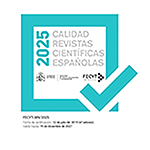La comunidad natural y moral del matrimonio en el derecho natural fichteano de 1796/1797
Resumen
En este trabajo intento establecer el rol que juega la familia, entendida como una comunidad moral basada en el desarrollo de la virtud y la ternura, en la teoría fichteana del Estado, concebido como una comunidad de ciudadanos egoístas. En primer lugar, reconstruyo la teoría del derecho y el Estado, de la concentración de los tres poderes en el soberano y la teoría de la desobediencia civil, así como sus problemas y contradicciones. Luego analizo la argumentación fichteana para diseñar la figura del matrimonio como una comunidad natural y moral de personas virtuosas. Finalmente, intento mostrar que la familia tiene la función de compensar las deficiencias que el supuesto del egoísmo universal acarrea para la teoría fichteana del Estado.Descargas
Descarga artículo
Licencia
La revista Res Publica. Revista de Historia de las Ideas Políticas, para fomentar el intercambio global del conocimiento, facilita el acceso sin restricciones a sus contenidos desde el momento de su publicación en la presente edición electrónica, y por eso es una revista de acceso abierto. Los originales publicados en esta revista son propiedad de la Universidad Complutense de Madrid y es obligatorio citar su procedencia en cualquier reproducción total o parcial. Todos los contenidos se distribuyen bajo una licencia de uso y distribución Creative Commons Reconocimiento 4.0 (CC BY 4.0). Esta circunstancia ha de hacerse constar expresamente de esta forma cuando sea necesario. Puede consultar la versión informativa y el texto legal de la licencia.









